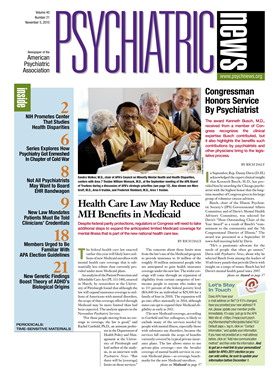APA has gone through many changes in the past two and a half years. We have had to adjust to smaller budgets, fewer staff, and a significantly reduced governance structure. As I discussed in my last column, we have also gone through an organizational restructuring that reduced the number of APA entities from four to two.
One of the greatest challenges of my presidency has been to determine how APA can best allocate resources to respond to the needs of our members and our patients in the most effective way possible. At the September Board of Trustees meeting (see
Board Addresses APA's Future in Several Critical Areas), APA Board members identified the major strategic priorities for APA for the next few years. In preparation for the meeting, I invited input from the major subspecialty groups in psychiatry and from the Assembly, district branches, state associations, national staff, and individual APA members.
The Board focused on four major areas: member services (such as improving the fiscal viability of psychiatry, the development of evidence-based performance measures, and continuing medical education, including support for maintenance of certification); advocacy (such as health care reform, parity implementation, and scope-of-practice issues); psychiatry's role in the house of medicine; and leadership development. In addition, we discussed specific issues such as the purpose of research within APA, how to best work synergistically with subspecialty organizations, how to optimize our connections with the international community, and how to best integrate identity groups within the Association. Central to all of these initiatives are efforts to increase effective communication across the Association. To facilitate this effort, Board members participated in the meetings of APA's councils, which were held just prior to the Board meeting as part of our annual September component meetings. The goal was to provide a more effective liaison relationship with the activities of the councils and to share the priorities of the Board with council members. Dr. John Oldham, APA's president-elect, and I met separately with all council chairs; also, council chairs were invited to attend the first half of the Board meeting.
Going forward, Board members will continue to communicate with the councils and encourage greater collaboration between council members and the Assembly. Each council has Assembly representation, and we are working to strengthen the role of the Assembly liaisons and thus encourage greater cooperation and collaboration among all parts of APA's governance. Dr. Oldham and I will be working with Drs. Bruce Hershfield and Ann Sullivan (speaker and speaker-elect, respectively) at the Assembly meeting this month, going together to Area Council meetings, and working closely with Assembly members to further enhance communication and collaboration.
Another major topic discussed at the Board meeting was the particular need to focus on communication throughout the organization, with a special emphasis on our younger membership and newest colleagues—early career psychiatrists (ECPs) and members in training (MITs). They will be working not only through the newly formed Council of MITs (CoMIT), but with the Council on Communication, the Membership Committee, and Office of Membership to increase participation and involvement of the next generation of psychiatrists in our Association.
Extensive discussions in these groups have highlighted the need for personal connections both at the local level and through mult iple electronic vehicles (Facebook, e-mail, and so on). ECPs will be reaching out to younger members at the district-branch level and will work with the MITs and training directors to identify residents and fellows who are completing training, regardless of whether they are APA members. Discussion included recommendations to have ECPs send out information to residents and fellows who are completing training regarding APA membership benefits long before dues notices of increased cost are sent.
The enhancement of mentorship programs at the national level and their development by district branches have been enthusiastically endorsed by MITs and ECPs at the town-hall meetings I have been holding. Several district branches (Washington Psychiatric Society is an example) have developed effective programs that we hope to share nationally.
Although APA communicates with its members in a variety of ways, we are all so busy that it is easy to lose sight of the many activities and initiatives that our Association undertakes on our behalf. I believe that the increased focus on communication and collaboration established by the Board will facilitate our efforts to keep you better informed. Because we are all subject to a flood of information, it is clear that we must figure out methods to enhance personal communication so that specific tools such as slide sets on depression, talking points for legislators, and strategies to prepare for recertification and maintenance of certification reach you. As we take advantage of new technologies and state-of-the-art communication vehicles, we will be even more effectively poised to assist you in your work and in your educational needs to deliver high-quality mental health services to all Americans.


